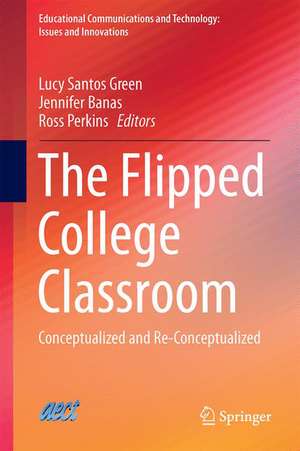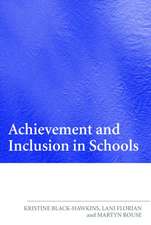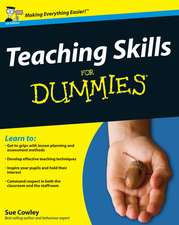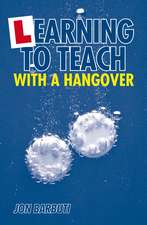The Flipped College Classroom: Conceptualized and Re-Conceptualized: Educational Communications and Technology: Issues and Innovations
Editat de Lucy Santos Green, Jennifer R. Banas, Ross A. Perkinsen Limba Engleză Hardback – 17 noi 2016
| Toate formatele și edițiile | Preț | Express |
|---|---|---|
| Paperback (1) | 583.13 lei 6-8 săpt. | |
| Springer International Publishing – 27 iun 2018 | 583.13 lei 6-8 săpt. | |
| Hardback (1) | 786.36 lei 6-8 săpt. | |
| Springer International Publishing – 17 noi 2016 | 786.36 lei 6-8 săpt. |
Din seria Educational Communications and Technology: Issues and Innovations
- 18%
 Preț: 895.58 lei
Preț: 895.58 lei - 15%
 Preț: 644.95 lei
Preț: 644.95 lei -
 Preț: 384.86 lei
Preț: 384.86 lei - 18%
 Preț: 1120.18 lei
Preț: 1120.18 lei - 15%
 Preț: 647.08 lei
Preț: 647.08 lei - 18%
 Preț: 1012.08 lei
Preț: 1012.08 lei - 18%
 Preț: 1011.14 lei
Preț: 1011.14 lei - 15%
 Preț: 649.54 lei
Preț: 649.54 lei - 15%
 Preț: 642.68 lei
Preț: 642.68 lei - 18%
 Preț: 1002.44 lei
Preț: 1002.44 lei -
 Preț: 385.47 lei
Preț: 385.47 lei - 18%
 Preț: 946.24 lei
Preț: 946.24 lei - 18%
 Preț: 951.47 lei
Preț: 951.47 lei - 18%
 Preț: 941.68 lei
Preț: 941.68 lei - 18%
 Preț: 948.61 lei
Preț: 948.61 lei - 18%
 Preț: 946.24 lei
Preț: 946.24 lei -
 Preț: 358.79 lei
Preț: 358.79 lei - 18%
 Preț: 1000.39 lei
Preț: 1000.39 lei - 18%
 Preț: 1006.37 lei
Preț: 1006.37 lei - 18%
 Preț: 964.10 lei
Preț: 964.10 lei - 18%
 Preț: 1006.55 lei
Preț: 1006.55 lei
Preț: 786.36 lei
Preț vechi: 958.98 lei
-18% Nou
Puncte Express: 1180
Preț estimativ în valută:
150.47€ • 157.10$ • 124.53£
150.47€ • 157.10$ • 124.53£
Carte tipărită la comandă
Livrare economică 04-18 aprilie
Preluare comenzi: 021 569.72.76
Specificații
ISBN-13: 9783319418537
ISBN-10: 331941853X
Pagini: 190
Ilustrații: XVIII, 261 p. 12 illus., 5 illus. in color.
Dimensiuni: 155 x 235 x 18 mm
Greutate: 0.57 kg
Ediția:1st ed. 2016
Editura: Springer International Publishing
Colecția Springer
Seria Educational Communications and Technology: Issues and Innovations
Locul publicării:Cham, Switzerland
ISBN-10: 331941853X
Pagini: 190
Ilustrații: XVIII, 261 p. 12 illus., 5 illus. in color.
Dimensiuni: 155 x 235 x 18 mm
Greutate: 0.57 kg
Ediția:1st ed. 2016
Editura: Springer International Publishing
Colecția Springer
Seria Educational Communications and Technology: Issues and Innovations
Locul publicării:Cham, Switzerland
Cuprins
Ch.1. The Flipped Classroom: A Brief, Brief History.- Ch.2. Step by Step, Slowly I Flip.- Ch.3. Tools of the Trade – What Do You Need to Flip?.- Ch.4. Evaluation…How Do You Know It Is Working?.- Ch.5. Flipping the Humanities.- Ch.6. Flipping Education.- Ch.7. Flipping Engineering. Ch.8. Flipping STEM.- Ch.9. Flipping Health Sciences.- Ch.10. Flipping Other Areas.-
Notă biografică
Lucy Santos Green is an associate professor in the Department of Leadership, Technology, and Human Development and an affiliate faculty member for both the Institute for Interdisciplinary STEM Education and the Center for the Study of International Schooling at Georgia Southern University. She holds a Master in Library and Information Science from Texas Woman’s University and a Doctorate in Instructional Technology from Texas Tech University.
Jennifer Banas is an associate professor in the College of Education at Northeastern Illinois University. Previous to this appointment she served as an instructional designer, faculty member and dean for a completely online institution, the American College of Education. Other career experience includes teaching high school health education, working as a county health educator, and conducting professional development with hospital employees and community members. Jennifer earned both her Doctorate in Instructional Technology and Master of Education in Curriculum & Design at Northern Illinois University. She also holds a Master of Public Health from the University of Illinois-Chicago. She completed her Bachelor of Science in Community Health at the University of Illinois, Champaign-Urbana.
Ross Perkins is an associate professor in the Department of Educational Technology at Boise State University where he serves as the coordinator of the online Ed. D. program. The focus of his research is on the diffusion of innovations as related to the adoption, implementation, and evaluation of technology tools and educational techniques. Dr. Perkins earned both a Master’s and Ph. D. in Curriculum and Instruction (Instructional Technology emphasis) at Virginia Tech University.
Textul de pe ultima copertă
This book provides a descriptive, progressive narrative on the flipped classroom including its history, connection to theory, structure, and strategies for implementation. Important questions to consider when evaluating the purpose and effectiveness of flipping are answered. The book also highlights case studies of flipped higher education classrooms within five different subject areas. Each case study is similarly structured to highlight the reasons behind flipping, principles guiding flipped instructions, strategies used, and lessons learned. An appendix that contains lesson plans, course schedules, and descriptions of specific activities is also included.
Caracteristici
Presents a guide to flipped classrooms for higher education, an untapped research area Focuses on case studies, examples, and resources in the higher education setting Analyzes flipped classrooms for a variety of subject areas, from the humanities to hard sciences








